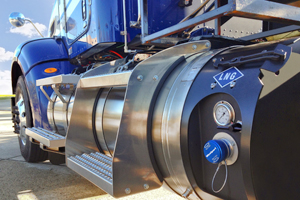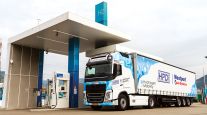Managing Editor, Features and Multimedia
Westport Cuts Staff After Sales Decline

The supplier of natural gas-vehicle technology trimmed its quarterly net loss to $25.5 million, or 40 cents per share, from a loss of $30.2 million, or 53 cents, in the same period last year, but quarterly revenue excluding joint ventures fell to $25.3 million from $46.5 million.
The Vancouver, British Columbia-based company pointed to declining oil prices and the discontinuation of the first-generation of its high-pressure, direct-injection engine technology a year ago as factors that contributed to the drop in revenue.
Although the price differential between natural gas and petroleum-based fuels remains intact in most markets, the downward movement of diesel and gasoline reduces the “psychological urgency” to migrate to a new fuel, CEO David Demers said on the company’s Oct. 30 earnings call.
In October, Westport implemented plans to reduce staffing, decrease executive pay by 12% on average and defer “non-core” programs, the company said. Those actions will generate savings of more than $13 million in 2015, it said.
“As part of Westport's efforts to match investments and expenses with the pace of market adoption, Westport has taken immediate actions to right-size the business structure and reduce expenses,” the company said.
“It’s no secret that markets are not evolving as rapidly as some predicted,” Demers said in the report.
However, Demers also said the development of natural-gas infrastructure continues to grow, and an increasing number of fleets are using trucks powered by the alternative fuel, sending the message that “natural gas is here to stay.”
“Customers are asking [original equipment manufacturers] to expand their natural-gas product offerings to match the wide variety and the specialized features that are offered today in diesel and gasoline vehicles,” he said. “More infrastructure is needed, and customers are going to want a big expansion in services and support as they make this transition to this new cleaner and cheaper fuel.”
Demers forecasted that the market penetration of natural-gas vehicles in the U.S. trucking market will rise to between 7% and 10% by 2020.
Westport also reported an adjusted operating loss before tax, depreciation and amortization of $5.4 million in the third quarter, reversing the positive adjusted EBITDA of $1 million it achieved during the second quarter.
The company said it aims to report consolidated positive adjusted EBITDA by the end of 2015 as it shifts from “market creation work” to profitability.
In an investors note, analyst Ann Duignan of J.P. Morgan Securities said that target “seems like a stretch in our view, given the macro headwinds as well as what could turn out to be a secular decline in oil prices.”
She said her firm “remain[s] skeptical of the long-term viability of the business, but believe[s] that the intellectual property may be of value to a strategic investor.”
Westport’s joint venture with engine maker Cummins Inc. shipped 2,171 engines during the quarter, down from 2,409 units a year earlier, primarily due to lower volumes of the 8.9-liter ISL G engine for North American trucking applications and the timing of orders for the refuse market, Westport said.
Through nine months, Cummins Westport’s cumulative 2014 engine shipments rose 11% to 7,130 units.
Year-to-date shipments in North America have increased 15%, driven by 35% growth in engines for truck applications reflecting the launch of the 11.9-liter ISX12 G engine last year.
Quarterly revenue for Cummins Westport declined 9% to $70.6 million, while the joint venture’s net income attributable to Westport fell to about $900,000, compared with $2.5 million income in the prior-year period.
Meanwhile, revenue for Westport’s on-highway systems business unit dropped to $6.6 million, from $17 million a year earlier, due to the discontinuation of its 15-liter HPDI engine and lower sales of Wing Power Systems for Ford vehicles, which it attributed to declining gasoline prices.
However, quarterly revenue for Westport’s joint venture with Chinese engine maker Weichai Power Co. jumped 56% to $179.3 million as engine shipments surged 61% to 14,587.
Weichai Westport Inc. held about 74% share of the Chinese 10- to 13-liter natural-gas engine market at the end of September, Westport said.




